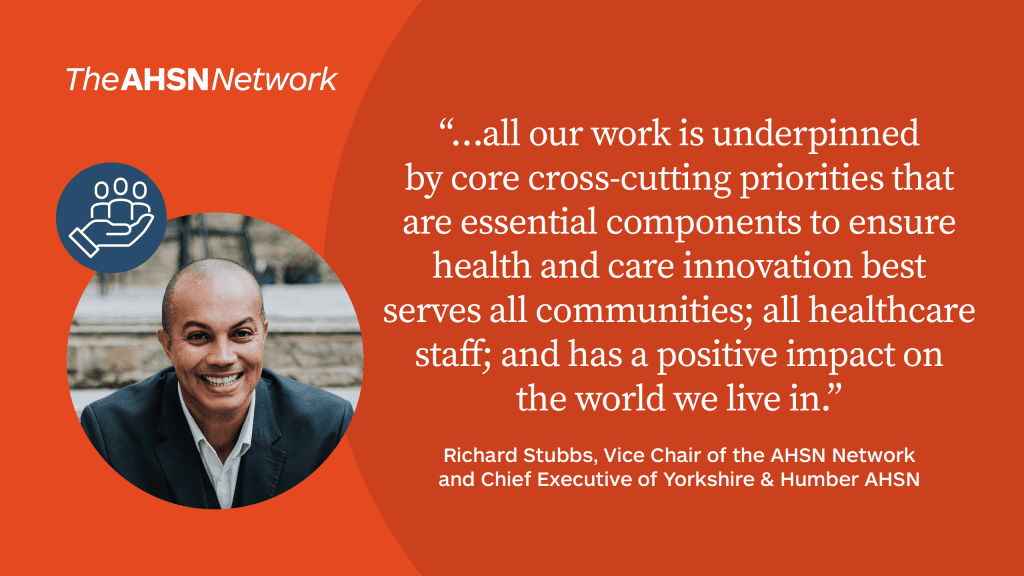We’ve recently released our AHSN Network impact report, reflecting on our national work from April 2021 to the end of March this year.
This report covers the impacts of our core work programmes, including more than 480,000 patients benefiting from our national programmes and initiatives; and our support for innovators resulting in £455m of investment leveraged into the UK economy.
Something essential to acknowledge is that all our work is underpinned by core cross-cutting priorities. These are the critical components to ensure health and care innovation best serves all communities; all healthcare staff; and has a positive impact on the world we live in.
These underpinning themes and principles include diversity and inclusion; health inequalities; patient and public involvement and co-design; digital solutions and AI; workforce; sustainability and the environment; and patient safety.
Here are my reflections on the importance of these themes, and our progress as a Network over the last year. Our work on these areas is continual and I look forward to sharing more over the coming months.
Diversity and inclusion
We are dedicated to increasing diversity in health and care innovation. Supporting diversity allows the innovation landscape and NHS to better reflect the communities we serve, and in turn, enabling diversity and inclusion are imperative to understanding and addressing health inequalities.
As a Network, in 2019, we committed to a set of diversity pledges to hold ourselves to account for how we identify and nurture innovations and the innovators behind them. They ensure we consider all members of our communities when establishing new innovative approaches to healthcare challenges.
I’m proud of our work to enact our diversity pledges. We’ve used our experiences over the last two years to develop a diversity and inclusion progress and learning report – which includes case studies, learnings and a set of pledges that can be adopted by any organisation. So join us on this journey!
Health inequalities
We work regionally and nationally to reduce health inequalities and ensure our work aligns to the NHS Core20PLUS5 approach and beyond.
This year we started to undertake equality impact assessments on our national programmes to inform planning around targeting specific population groups, including conducting focused community engagement work. You can see an example of our approach to health inequalities undertaken as part of our Lipid Management and Familial Hypercholesterolaemia programme.
Patient and public involvement and co-design
We must design and spread innovation that transforms healthcare in partnership with patients, the public, carers, and communities. This has always been high on our agenda, and we have further plans to bring diverse perspectives together and listen to people’s experiences and insights. For example, we’ve developed a new outcomes framework this year as part of our national programme selection process. The framework is a way to ensure patient involvement and co-production is embedded from the initiation of a programme – I know we can build on this approach over the coming months.
Digital solutions and AI
The pandemic highlighted how impactful digital solutions and Artificial Intelligence (AI) can be for our health and care system. Over the last year, we’ve seen an increased appetite to build on the momentum of digital and AI adoption.
AHSNs have continued to work with their local Integrated Care Systems (ICSs) and healthcare providers to embed digital and AI solutions. We’ve also been working to support companies developing their solutions and evidencing them in real-world settings and seeing many AHSN-supported companies achieve funding through initiatives like the AAC’s AI award.
Through the national Innovation Collaborative – a learning and support system for professionals involved in delivering technology-enabled health and care innovations – more than 286,000 people were supported at home through technology-enabled remote monitoring. This shows how critical collaboration and shared learning can be to underpin digital and AI solutions, which can’t be rolled out in isolation.
Workforce
The workforce is the backbone of the NHS and social care system. Therefore, properly supporting the health and care workforce has a significant impact, including through efficiencies and providing a better staff experience.
From January 2021-January 2022, we delivered and evaluated a national workforce programme, where AHSNs have rolled out digitally focused pathway transformation initiatives unique to the needs of their region. The programme included 15 initiatives, ranging from introducing digital innovations in care homes to supporting education and self-management processes for patients with long term conditions.
The programme had impressive impacts, including almost 40,000 hours of capacity released and emergency admissions reduced by 978.
As a result of the programme, AHSNs are now measuring the workforce impacts of all initiatives.
Sustainability and the environment
In acknowledgement of its impact on the environment, the NHS has committed to becoming carbon net-zero by 2040 and to making other changes to become more sustainable. Innovation is central to supporting the NHS towards a more sustainable and environmentally conscious healthcare system. The health and care system needs to do things differently to achieve wide-scale change, and innovation is a core component.
Over the last year, we’ve engaged with more than 1,000 delegates through our environmental sustainability sharing and learning events. These events bring together health and care colleagues to share and learn from others and have so far covered reducing the environmental impact of asthma inhalers and anaesthetic gases, with the next event focusing on innovation in waste. Health innovation has the potential to be a major contributor to our greener NHS Net Zero ambitions and this will be a significant area of focus for the AHSN Network over our next license period.
Patient safety
Our commitment to patient safety isn’t just embodied through our Patient Safety Collaboratives but is an essential element throughout all our work. We spread healthcare innovation to improve patient outcomes and experience, and patient safety is central to that.
This year we’ve updated our patient safety plan which sets out how we intend to support the delivery of the NHS patient safety strategy. Our updated plan aligns with new ICS structures and improvement programmes. We’ve also engaged with the new patient safety specialist roles established this year, aiming to put patient safety at the heart of every NHS organisation in England.
Looking ahead
I was particularly excited to launch our new Innovate Awards earlier this year with our partners at NHS Confederation. The awards celebrate examples of excellence in health and care innovation and transformation. You’ll notice that most of the categories are centred around these crucial themes. We’d encourage our colleagues across the health and care system to enter to share their hard work and receive the recognition they deserve for forging ahead with transformation projects in these areas. The deadline is midnight on Thursday 23 June 2022 and entries can be made here.
These principles and components of our work will continue to grow and develop, and I look forward to seeing the significant progress we can achieve together.
Read the full AHSN Network impact report.

The government has set out three shifts it wants to see happen: treatment to prevention, hospital to community, analogue to digital. HealthTech has a crucial role in supporting the delivery of all three. But using technology to help deliver these changes requires procuring the technology, and when all the noise is about there being no [...]

Dr Anish Bhuva, is the founder of Pace MRI, a Consultant Cardiologist at Barts Heart Centre and an Associate Professor at University College London. Tell us about the innovation. What does it do, how does it help, who does it help and why is it important? Pace-MRI is an award-winning digital tool that manages complex [...]

As we celebrate International Women’s Day, Anna King, Commercial Director at Health Innovation Network South London, identifies how FemTech is 'Accelerating Action' in UK healthcare and driving economic growth. In recent years, FemTech - the sector focused on women’s health and wellness technology - has gained significant traction globally. In the UK, this growing sector [...]









